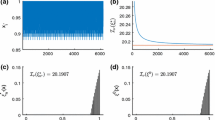Abstract
This paper studies minimally-supported D-optimal designs for polynomial regression model with logarithmically concave (log-concave) weight functions. Many commonly used weight functions in the design literature are log-concave. For example, \((1-x)^{\alpha+1}(1+x)^{\beta+1}(-1\le x\le 1,\alpha\ge -1,\beta\ge -1),x^{\alpha+1}\exp(-x) (x\ge 0,\alpha\ge -1)\) and exp(−x 2) in Theorem 2.3.2 of Fedorov (Theory of optimal experiments, 1972) are all log-concave. We show that the determinant of information matrix of minimally-supported design is a log-concave function of ordered support points and the D-optimal design is unique. Therefore, the numerically D-optimal designs can be constructed efficiently by cyclic exchange algorithm.
Similar content being viewed by others
References
An MY (1998) Logconcavity versus logconvexity: a complete characterization. J Econ Theory 80:350–369
Antille G, Dette H, Weinberg A (2003) A note on optimal designs in weighted polynomial regression for the classical efficiency functions. J Stat Plan Inference 113:285–292
Atkinson AC, Donev AN (1992) Optimum experimental designs. Oxford University Press, New York
Bagnoli M, Bergstrom T (2005) Log-concave probability and its applications. Econ Theory 26:445–469
Chang F-C (2005) D-optimal designs for weighted polynomial regression – a functional approach. Ann Inst Stat Math 57:833–844
Dharmadhikari S, Joag-dev K (1988) Unimodality, convexity, and applications. Academic, New York
Fedorov VV (1972) Theory of optimal experiments. Translated and edited by Studden WJ and Klimko EM. Academic, New York
Gradshteyn IS, Ryzhik IM (2000) Tables of integrals series, and products, 6th edin. Academic, New York
Ibragimov IA (1956) On the composition of unimodal distributions. Theory Probab Appl 1:283–288
Imhof L, Krafft O, Schaefer M (1998) D-optimal designs for polynomial regression with weight function x/(1+x). Stat Sinica 8:1271–1274
Kiefer JC, Wolfowitz J (1960) The equivalence of two extremum problems. Can J Math 12:363–366
Luenberger DG, (1989) Linear and Nonlinear Programming 2nd edn. Addison-Wesley, New York
Meyer RK, Nachtsheim CJ (1995) The coordinate-exchange algorithm for constructing exact optimal experimental designs. Technometrics 37:60–69
Pukelsheim F (1993) Optimal design of experiments. Wiley, New York
Silvey SD (1980) Optimal design.Chapman & Hall, London
Wolfram S (2003) The mathematica book, 5th edn.Wolfram Media, Champaign
Author information
Authors and Affiliations
Corresponding author
Rights and permissions
About this article
Cite this article
Chang, FC., Lin, HM. On Minimally-supported D-optimal Designs for Polynomial Regression with Log-concave Weight Function. Metrika 65, 227–233 (2007). https://doi.org/10.1007/s00184-006-0072-9
Received:
Published:
Issue Date:
DOI: https://doi.org/10.1007/s00184-006-0072-9




